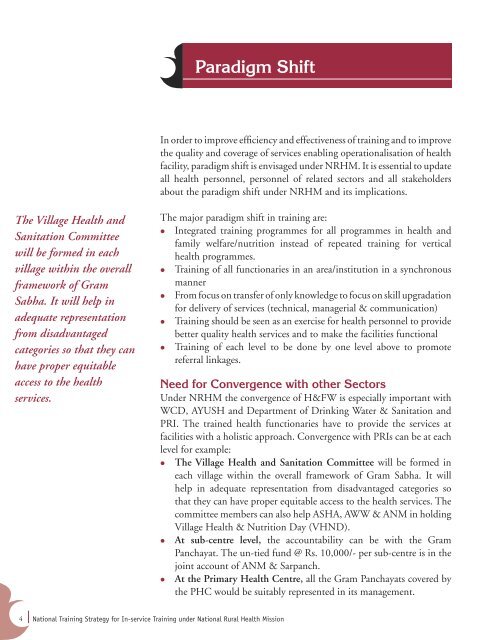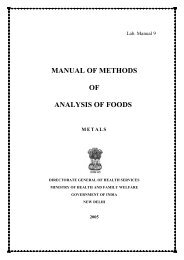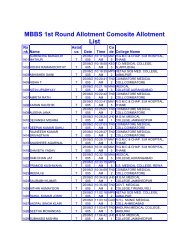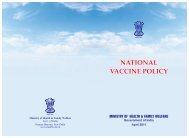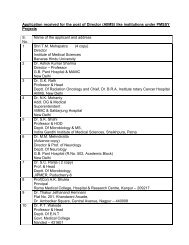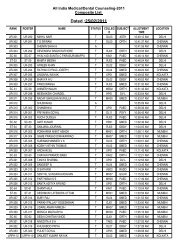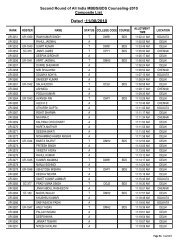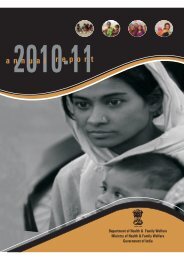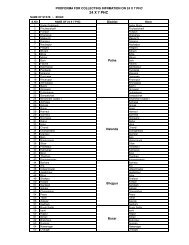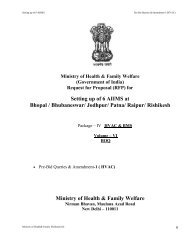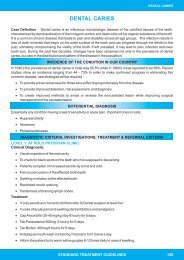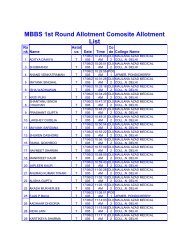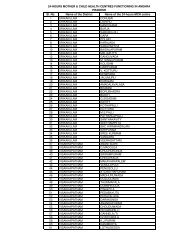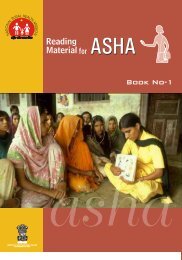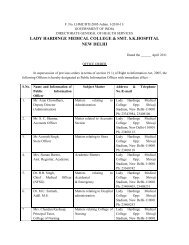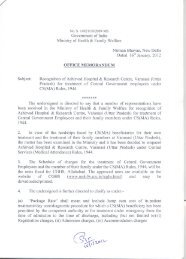National training strategy - Ministry of Health and Family Welfare
National training strategy - Ministry of Health and Family Welfare
National training strategy - Ministry of Health and Family Welfare
You also want an ePaper? Increase the reach of your titles
YUMPU automatically turns print PDFs into web optimized ePapers that Google loves.
The Village <strong>Health</strong> <strong>and</strong><br />
Sanitation Committee<br />
will be formed in each<br />
village within the overall<br />
framework <strong>of</strong> Gram<br />
Sabha. It will help in<br />
adequate representation<br />
from disadvantaged<br />
categories so that they can<br />
have proper equitable<br />
access to the health<br />
services.<br />
4<br />
Paradigm Shift<br />
<strong>National</strong> Training Strategy for In-service Training under <strong>National</strong> Rural <strong>Health</strong> Mission<br />
In order to improve efficiency <strong>and</strong> effectiveness <strong>of</strong> <strong>training</strong> <strong>and</strong> to improve<br />
the quality <strong>and</strong> coverage <strong>of</strong> services enabling operationalisation <strong>of</strong> health<br />
facility, paradigm shift is envisaged under NRHM. It is essential to update<br />
all health personnel, personnel <strong>of</strong> related sectors <strong>and</strong> all stakeholders<br />
about the paradigm shift under NRHM <strong>and</strong> its implications.<br />
The major paradigm shift in <strong>training</strong> are:<br />
� Integrated <strong>training</strong> programmes for all programmes in health <strong>and</strong><br />
family welfare/nutrition instead <strong>of</strong> repeated <strong>training</strong> for vertical<br />
health programmes.<br />
� Training <strong>of</strong> all functionaries in an area/institution in a synchronous<br />
manner<br />
� From focus on transfer <strong>of</strong> only knowledge to focus on skill upgradation<br />
for delivery <strong>of</strong> services (technical, managerial & communication)<br />
� Training should be seen as an exercise for health personnel to provide<br />
better quality health services <strong>and</strong> to make the facilities functional<br />
� Training <strong>of</strong> each level to be done by one level above to promote<br />
referral linkages.<br />
Need for Convergence with other Sectors<br />
Under NRHM the convergence <strong>of</strong> H&FW is especially important with<br />
WCD, AYUSH <strong>and</strong> Department <strong>of</strong> Drinking Water & Sanitation <strong>and</strong><br />
PRI. The trained health functionaries have to provide the services at<br />
facilities with a holistic approach. Convergence with PRIs can be at each<br />
level for example:<br />
� The Village <strong>Health</strong> <strong>and</strong> Sanitation Committee will be formed in<br />
each village within the overall framework <strong>of</strong> Gram Sabha. It will<br />
help in adequate representation from disadvantaged categories so<br />
that they can have proper equitable access to the health services. The<br />
committee members can also help ASHA, AWW & ANM in holding<br />
Village <strong>Health</strong> & Nutrition Day (VHND).<br />
� At sub-centre level, the accountability can be with the Gram<br />
Panchayat. The un-tied fund @ Rs. 10,000/- per sub-centre is in the<br />
joint account <strong>of</strong> ANM & Sarpanch.<br />
� At the Primary <strong>Health</strong> Centre, all the Gram Panchayats covered by<br />
the PHC would be suitably represented in its management.


